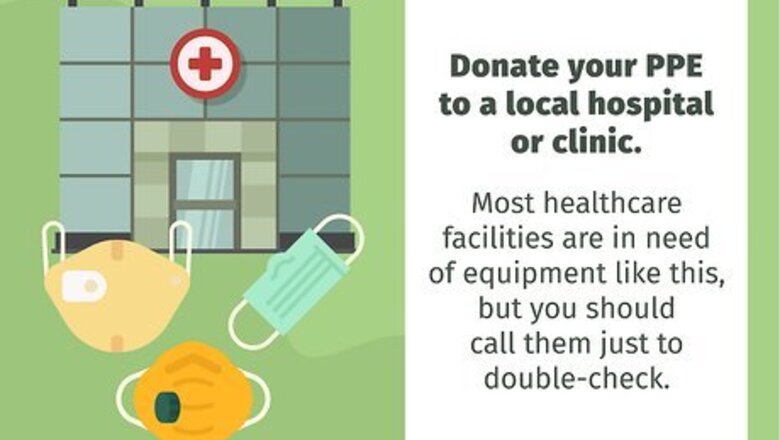
views
Donating Medical Supplies
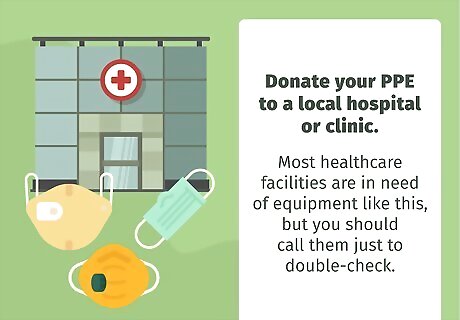
Donate your PPE to a local hospital or clinic. PPE, or personal protective equipment, like N95 medical grade face masks, latex or nitrile gloves, gowns, booties, and goggles can all be donated to your local hospital or a clinic. Most healthcare facilities require equipment like this, but you should call them just to double-check.Warning: If you or your family have used a PPE item, do not donate it. Unfortunately, PPE is not reusable.
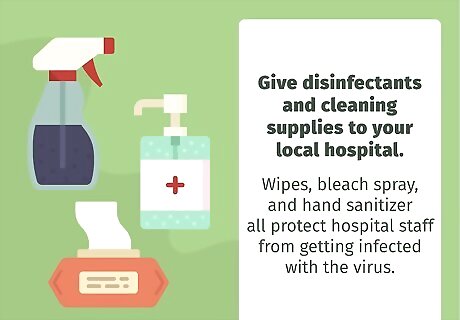
Give disinfectants and cleaning supplies to your local hospital. Wipes, bleach spray, and hand sanitizer all protect hospital staff from getting infected with the virus. If you have any extras, you can give them to your local hospital or clinic, so they can clean the rooms in between patients. Remember to keep some cleaning supplies for yourself to clean your own home.
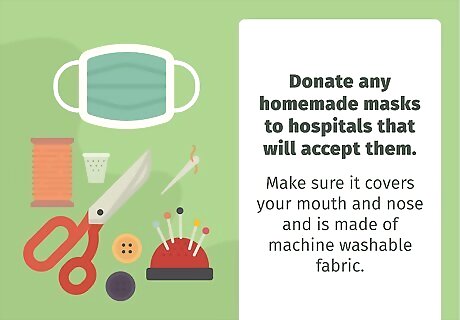
Donate any homemade masks to hospitals that will accept them. If you have made your own fabric face masks out of 2 layers of fine weave fabric, you may be able to give them to a hospital or clinic nearby. Some hospitals aren’t accepting homemade masks, so double check before you bring them in. There are a few different patterns online that teach you how to make medical-grade face masks. Make sure it covers your mouth and nose and is made of machine washable fabric.
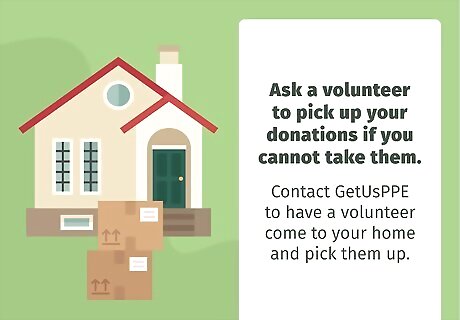
Ask a volunteer to pick up your donations if you cannot take them. If you have many items to donate, or you can’t leave the house, contact GetUsPPE to have a volunteer come to your home and pick them up. You can fill out a form online detailing where you live and what you have. Fill out a PPE donation form by visiting https://getusppe.org/give/.
Giving Away Food and Clothes
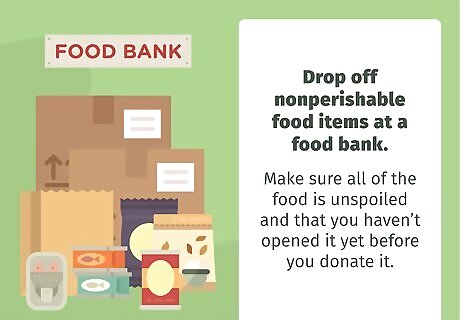
Drop off nonperishable food items at a food bank. Canned goods, jars of food, rice, dried herbs, and nut butters are all great items to donate to your local food bank. Make sure all the food is unspoiled and that you haven’t opened it, yet, before you donate it.Tip: Many food banks require volunteers. If you have time, consider picking up a few hours a week to sort through and organize food donations.
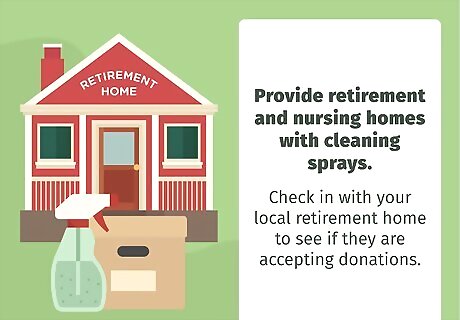
Provide retirement and nursing homes with cleaning sprays. Many retirement and nursing homes need more basic cleaning products, like bleach, multi-surface cleaners, and wipes. Check in with your local retirement home to see if they are accepting donations. Many retirement and nursing homes are limiting contact with outside visitors. If they are accepting donations, you will most likely have to leave them outside the door for someone to come pick up.
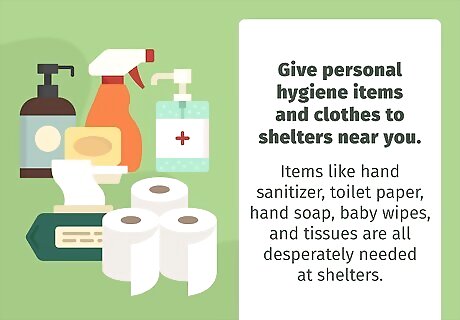
Give personal hygiene items and clothes to shelters near you. Items like hand sanitizer, toilet paper, hand soap, baby wipes, and tissues are all desperately needed at shelters. Socks, hats, and other basic clothing items are also helpful for people who do not have access to them. Check to see if a shelter near you is open before you donate your items. Homeless people with underlying conditions are especially at risk for coronavirus, since they cannot self-isolate. Personal hygiene items can help them stay virus-free.
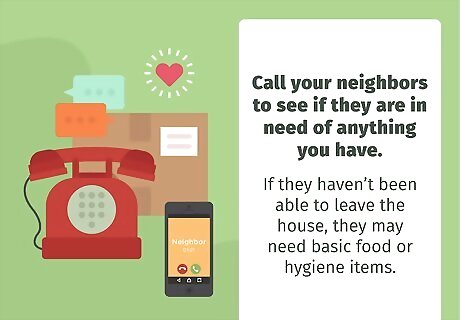
Call your neighbors to see if they need anything you have. Try calling your neighbors to see if they need any type of food or hygiene items, especially if they are elderly or have weakened immune systems. If they haven’t been able to leave the house, they may need basic food or hygiene items. You can drop off the items at their door to avoid any social contact. Avoid going to your neighbor’s house unless you can maintain a social distance of 6 feet (1.8 m) away. Try posting on your neighborhood’s Facebook or Nextdoor page to see if your neighbors need anything.
Helping in Other Ways
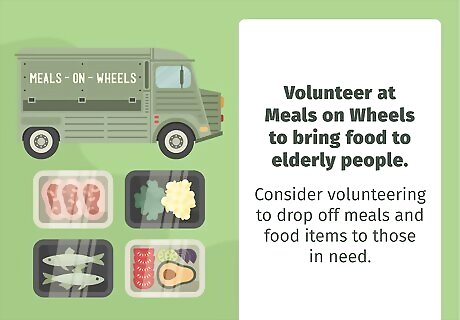
Volunteer at Meals on Wheels to bring food to elderly people. Many elderly people cannot leave their homes during this time. If you have extra time and access to a vehicle, consider volunteering to drop off meals and food items to those in need. You can sign up to volunteer at Meals on Wheels by visiting https://meals-on-wheels.com/volunteer/sign-up-to-volunteer/.
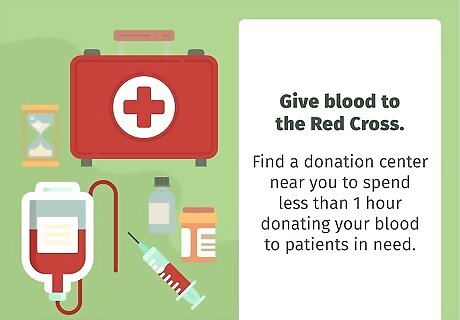
Give blood to the Red Cross. There is always a need for blood donation, and with more people staying inside, donation numbers are low. Find a donation center near you to spend less than 1 hour donating your blood to patients in need. Find a donation center near you by visiting https://www.redcrossblood.org/give.html/find-drive?mod=article_inline.
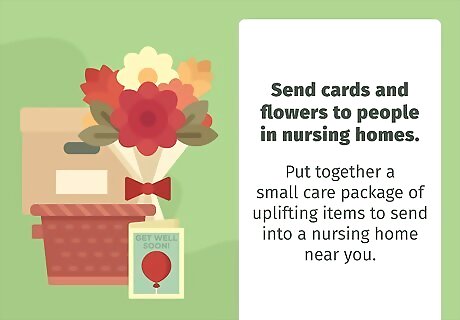
Send cards and flowers to people in nursing homes. Since the elderly are more at risk, nursing and retirement homes are becoming more and more isolated. Many are accepting cards, flowers, and small gifts, so their residents can feel more connected to the outside world. Put together a small care package of uplifting items to send into a nursing home near you.Did You Know? You can donate items like this even if you don’t have a loved one in a nursing home.
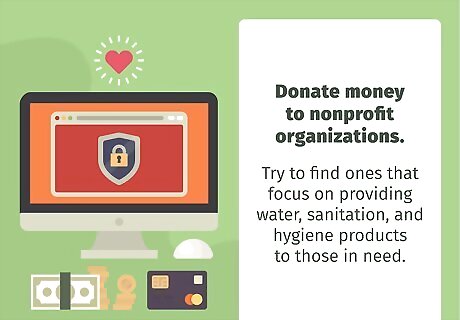
Donate money to nonprofit organizations. There are many nonprofits who are focusing on the outbreak of the coronavirus. Try to find ones that focus on providing water, sanitation, and hygiene products to those in need. Lutheran World Relief, Heart to Heart International, and Doctors Without Borders are a few charity organizations you could donate to.




















Comments
0 comment